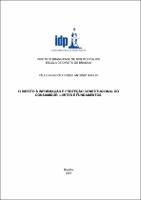Use este identificador para citar ou linkar para este item:
https://repositorio.idp.edu.br//handle/123456789/3649| Título: | O direito à informação e proteção constitucional do consumidor: limites e fundamentos. |
| Autor(es): | Khouri, Paulo Roberto Roque Antônio |
| Orientador(es): | Branco, Paulo Gustavo Gonet |
| Palavras-chave: | Direito à informação;dever de proteção constitucional do consumidor;limites e fundamentos |
| Data de submissão: | 2022 |
| Citação: | KHOURI, Paulo Roberto Roque Antônio. O direito à informação e proteção constitucional do consumidor: limites e fundamentos. 2021. 278 f. Tese (Doutorado em Direito Constitucional) Instituto Brasileiro de Ensino, Desenvolvimento e Pesquisa, Brasília, 2022. |
| Resumo: | A partir do marco constitucional do art. 5.º, XXXII, a presente investigação se debruçou sobre a importância do direito à informação nas relações de consumo e seus limites. A assimetria informativa é o grave problema que impeliu o legislador à outorga do direito à informação na busca de efetividade do dever proteção constitucional do consumidor. Embora o problema fático que leva à necessidade da outorga do direito à informação é vulnerabilidade do consumidor, ou seja, sua dificuldade de autoproteção, o fundamento jurídico desse direito está na proteção constitucional da igualdade e da liberdade. Esse direito é concedido em favor do consumidor para que sejam restabelecidas minimamente a igualdade e a liberdade nas relações de consumo. Nesse sentido, o direito à informação atua não como um fim em si mesmo, mas como um direito instrumental que
visa à tutela específica de interesses do consumidor, quais sejam: (i) a liberdade de escolha; (ii) a saúde e segurança; e (iii) o interesse econômico na execução do contrato. O direito à informação do consumidor tem seu regime geral no art. 6.º, III, do CDC que impõe a necessidade de que toda informação ao consumidor seja clara e adequada. Enquanto a clareza volta-se para a compreensibilidade do que é informado, a adequação concentra-se em identificar se as informações disponibilizadas são essenciais à tutela dos interesses
protegidos. Defendeu-se, no âmbito desta investigação, que, por conta da adequação, o fornecedor não está obrigado a informar sobre todos os aspectos do produto ou serviço ao consumidor, devendo selecionar previamente quais informações são aptas à tutela dos interesses protegidos no fornecimento específico do produto ou serviço. Identificou-se ainda, no âmbito deste trabalho, com suporte em uma pesquisa de campo quantitativa, a presença de vários obstáculos que vão militar contra a efetividade do direito à informação
na tutela dos interesses que busca proteger, inclusive, a inércia do próprio consumidor, visto que cerca de 40% dos consumidores declararam que não leem total ou parcialmente as informações disponibilizadas. Como a mensagem informativa ao consumidor pertence, naturalmente, ao processo de comunicação que se estabelece com o fornecedor; emergem também todos os obstáculos naturais desse processo, inclusive os próprios ruídos comunicacionais, a militarem contra a efetividade do próprio direito. A investigação também
apontou que o consumidor pode exercer sua liberdade e autodeterminação sobretudo recusando-se livremente e sem constrangimentos a se informar. |
| Abstract: | Based on the constitutional framework of Article 5, XXXII, this research focused on the importance of the right to information in consumer relations and its limitations. The informational asymmetry constitutes a serious problem which has led the legislator to grant the right to information in the search for effectiveness of the constitutional protection duty of the consumer. Although the factual problem is is the consumer's vulnerability or, in other words, their difficulty in protecting themselves, the legal basis of this right is in the constitutional protection of equality and freedom. This right is granted in favor of the consumer so that equality and freedom in consumer relations are minimally restored. In this sense, the right to information acts not as an end in itself, but as an instrumental right that aims at the specific protection of consumer interests, namely: (i) freedom of choice; (ii) health and safety; and (iii) economic interest in the performance of the contract. The right to consumer information has its general regime in article 6, III, of the CDC, which imposes the need for all consumer information to be clear and adequate. While the clarity focuses on the inteligibility of what is informed; the adequacy concentrates on identifying whether the information made available is essential to the protection of the protected interests. This research defendsthat, due to the adequacy, the supplier is not obliged to inform about all the aspects of the product or service to the consumer, and must previously select which information is suitable to protect the interests protected in the specific supply of the product or service. Supported by quantitative field research, this paper identifiesseveral obstacles to the effectiveness of the right to information in the protection of the interests it seeks to protect, including the inertia of the consumer himself, since about 40% of consumers have statd that they do not read all the information available. As the informative message to the consumer naturally belongs to the communication process that is established with the supplier, all the natural obstacles of this process also emerge, including the communication noise itself, which also work against the effectiveness of the right itself. The investigation also pointed out that the consumer may exercise their freedom and self-determination, including by freely and unconstrainedly refusing to be informed. |
| URI: | https://repositorio.idp.edu.br//handle/123456789/3649 |
| Aparece nas coleções: | Doutorado Acadêmico em Direito Constitucional |
Arquivos associados a este item:
| Arquivo | Descrição | Tamanho | Formato | |
|---|---|---|---|---|
| TESE_ PAULO ROBERTO ROQUE ANTÔNIO KHOURI_DOUTORADO_DIREITO.pdf | 3.17 MB | Adobe PDF |  Visualizar/Abrir |
Os itens no repositório estão protegidos por copyright, com todos os direitos reservados, salvo quando é indicado o contrário.
